What to write in the subject of the letter: choose words wisely
Most of us decide which letters are worth reading, based on a brief look at the letters in the mailbox. We thought that with such a significant role of the subject of the letter in attracting a potential reader, it would be interesting to check how much the openness of messages in the list can depend on a single word in the subject of the letter .
To find out, we studied about 24 billion delivered mail messages, the topics of which were made up of about 22 thousand different words. If for you it sounded like "a lot of data," believe me, that was how it was.
Translation of an article by MailChimp guys was made by Alconost localization company .
')

We have included in the study the topics of letters of both general and specific industry orientation. Below is a brief list of our criteria and approaches:
The numbers shown in the graphs below are quadratic deviations from the average openability of letters from one user as part of the mailing list. Words with positive impact indicators increased openability, with negative ones - they affected it negatively.
The results of regression analysis suggest that similar words often have a similar effect on the discovery of letters. It makes sense. However, the exact selection of the right words can increase discoverability without significant changes in the essence of the message. Again, in order to interpret these results, it is important to know that the standard deviation is a normalized indicator of how much something deviates from the mean. For users with large fluctuations in the rate of opening of letters, the deviation will be higher, and for users with constant openability - lower. This means that a careful selection of words will have a greater impact on the opening of letters for people with higher quadratic deviations, while for users with stable openability, the difference will be insignificant.
MailChimp auto-substitution tags allow senders to include the first and last names provided by the recipients in the subject or body of the mailing list. The impact of this approach was previously considered controversial, but now everyone agrees that it is positive. Our analysis showed that personalization really enhances the openability of letters. Here is one of the most interesting findings: despite the fact that the usual practice does not imply the use of the name and surname at the same time in the subject of the letter, this option gives the strongest positive effect on discovery. Many of these ezines seem to contain highly personalized content.
Congratulations, * | FNAME | * * | LNAME | *
TED2014: Registration invitation for * | FNAME | * * | LNAME | *
Hello, * | TITLE: FNAME | * * | TITLE: LNAME | *. Please update your email settings.

Our analysis also showed that personalization using a name is used much more often than using only a surname or a first and last name together, so we decided to find out how the impact of such personalization varies across industries. We focused on industries where the impact was significant, and revealed several with a large positive effect from using the name alone. The most surprising discovery was the fact that personalization using the name has a negative effect on the opening for the branch of law.

Will a potential reader open a letter after seeing the word “free” (free) in the subject line? It attracts his attention, but not always. The next few graphs show that despite the fact that the influence of the word “free” in the subject is positive and statistically significant for certain industries, it decreases if we examine this indicator for all industries at a higher level. Interestingly, the use of the word “gift” (freebie) showed a much greater increase in the opening of letters.
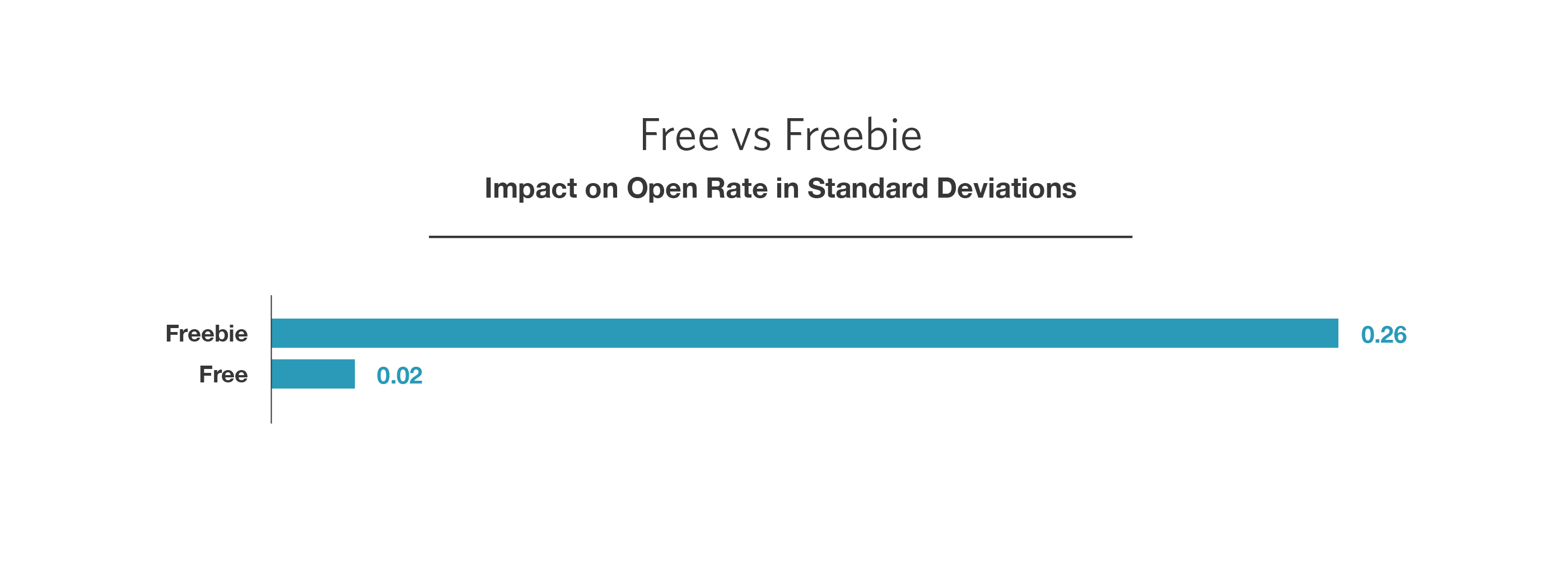
High-level results show that the use of the word “free” does not have a big impact, but we studied the situation by industry to find out if the conclusion is true for all directions without exception. We found that in the medical, commercial, and tourist industries, the use of the word “free” should be avoided, but in the restaurant and entertainment fields, this word can be of some benefit.
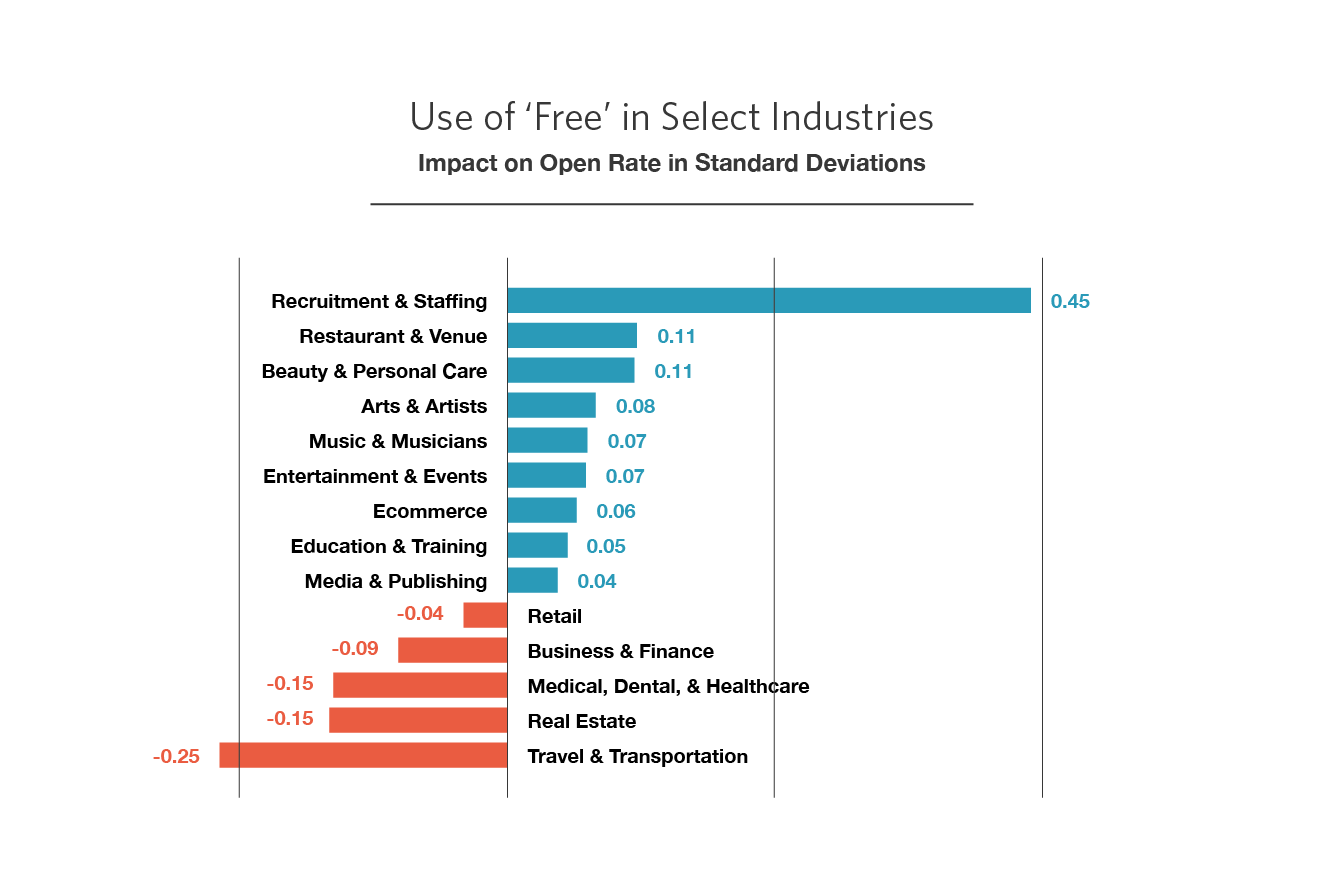
Understandably, all your letters are very important. But there are times when you feel that you need to use a couple of attention-grabbing words to tell your readers that your last message needs to be read immediately. It works. Words like “urgent” and “important” provide for discovery much higher than usual.

It is much easier for recipients to be interested in announcements and invitations to events than on information about their cancellation and reminders. It turns out that repeated reminders and messages about the cancellation do not attract their interest equally.
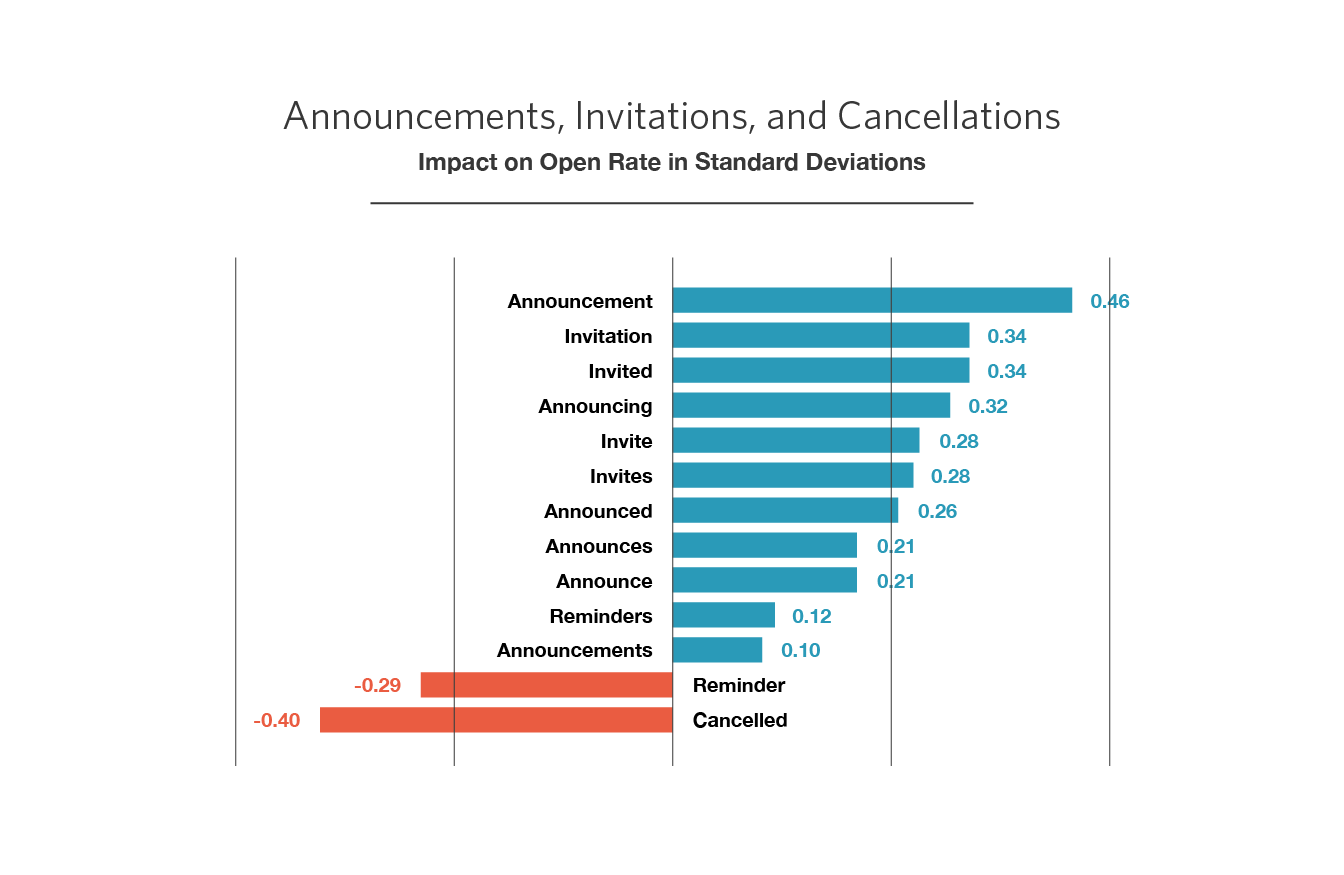
It is not surprising that people do not open a letter about the cancellation of events. Sometimes the subject of the letter provides all the necessary information. But we still decided to find out whether this effect is observed in all sectors. And they found that wherever the use of the word “canceled” in the subject line of the letter demonstrates a significant impact, it is negative, except for the restaurant industry, where it seems that the recipients encourage reading to continue.

The study showed that words related to charity and donations have a negative effect on the discovery of letters. However, accurate selection of the right words can mitigate the negative effect of requests for donations. Of all the related words that participated in the study, the most negative influence is exerted by “donation” (donation). The word “help” gives the best effect, although it can obviously be used in a wider context.
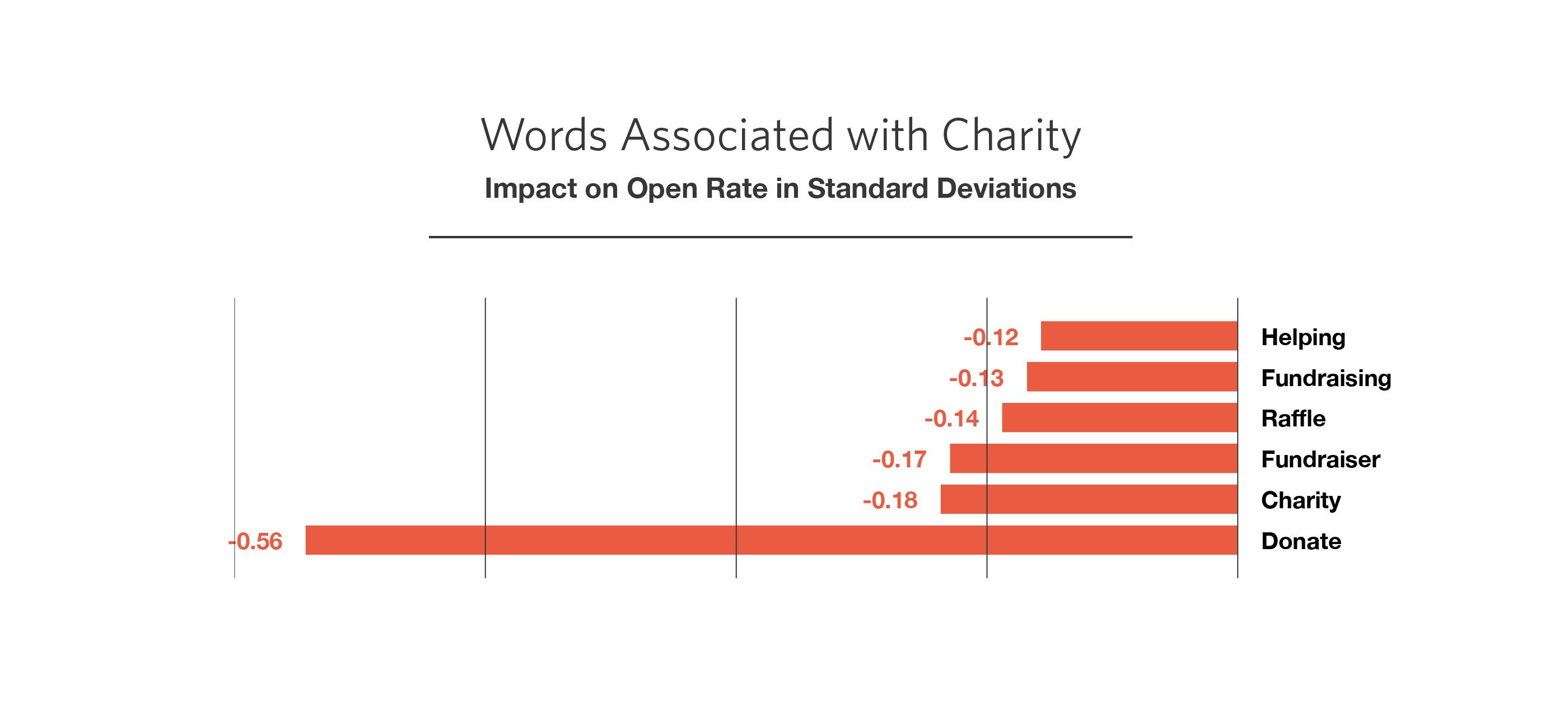
During the analysis, we identified a set of frequently occurring verbal pairs. Sometimes two words provide a context that cannot be conveyed by one. We found it interesting to look at the effectiveness of some of these pairs.
First of all, people love to be thanked. It is also obvious that newsletters relating to current events, such as natural disasters and political problems, demonstrate the openness of letters above the norm. And in the end, it seems that recipients do not like being asked to subscribe to something, and they hate it when they are told that they are missing their last chance to get something they already wrote about.
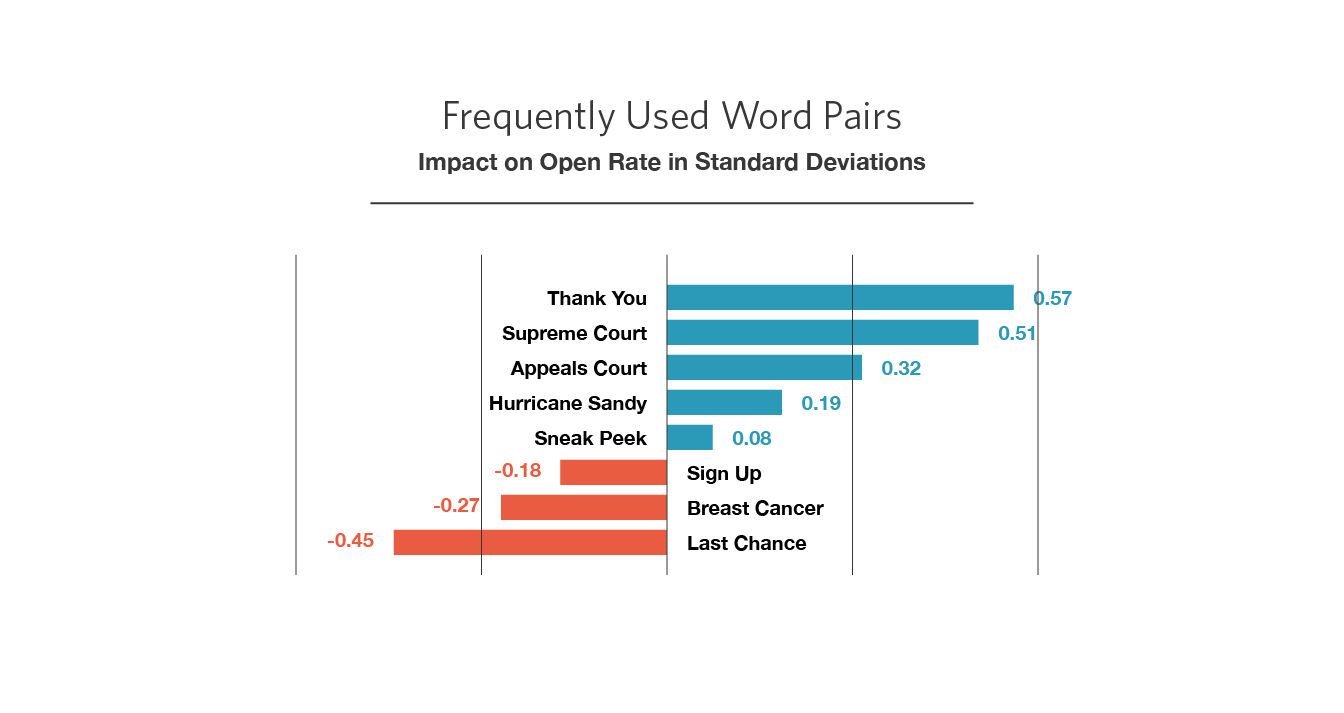
When performing the analysis, we paid attention to the effect of the use of capital letters on the opening of letters. The results we were pretty surprised. First of all, it turned out that the subject of the letter written in all capital letters gives an openness slightly higher than normal for this user / mailing list.
Then we took it even wider to see how the presence of at least one word, completely written in capital letters, and found a small negative effect. Both of these influences, although small, are statistically significant. It should be noted that our methodology evaluates the effectiveness of mailings in comparison with other mailings from the same sender to the same list of recipients. This means that all capitalized letter threads give the highest openability of letters to senders, who also use themes written with letters in both upper and lower case letters.
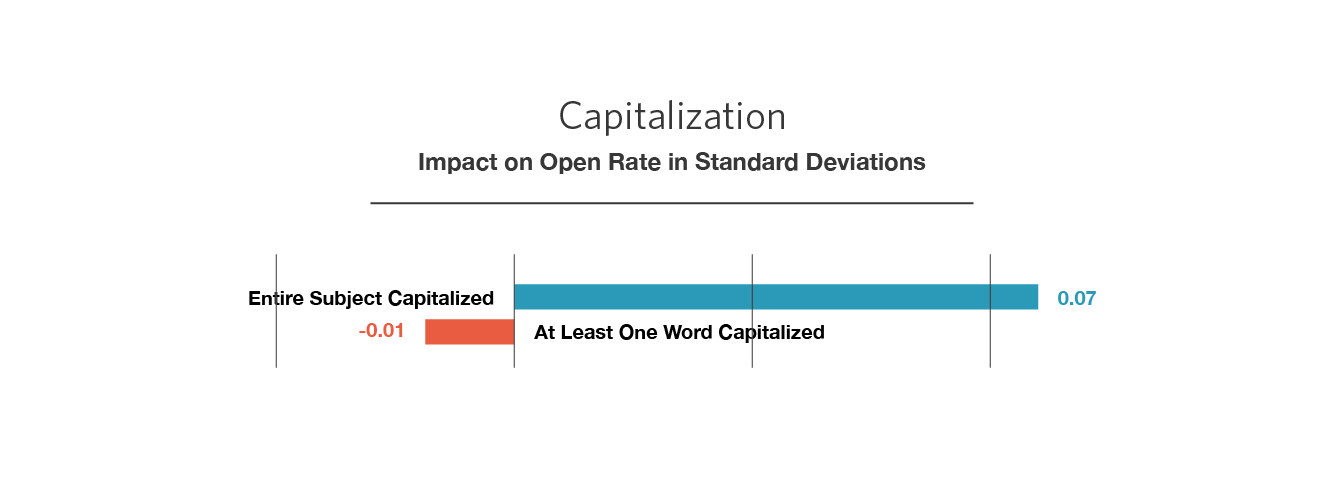
Many of these results can be applied to mailings in the most direct way. For example, we can say that the approaches listed below will increase the frequency of opening letters:
We can also say that the exact selection of words when collecting donations or reminding your recipients of upcoming events can reduce the number of open letters.
But the most interesting conclusion is that the presence of a single word can completely change the likelihood of opening your letters to your readers.
It is the content of your message that determines which words you use, but with such a limited number of words in the subject line, each of them means a lot.
MailChimp's tracking capabilities allow you to look at your own newsletters in the same way. You may notice a fresh letter requiring “donations” instead of “help”, or a critical letter designated not as “important”, but as “urgent”. Basic statistics on mailing gives you the opportunity to find out what works best for your recipients, A / B testing allows you to automatically conduct experiments to see which words work for your subscribers, and ultimately make the best choice. And just remember that one word can change everything.
Translator’s note: in their article, the Mailchimp guys forgot another important factor: the subject of the letter (like the whole letter) should be easy to read and, of course, does not contain grammatical errors. The “oblique” style of writing, errors and mistakes reduce the percentage of opening letters and increase the number of readers who have unsubscribed from the list.
If you write letters in your own language, there are no problems with mistakes and style (usually), but if you need to write texts in a foreign language, then even good knowledge of the language is not enough to create an elegant, easily readable and error-free text.
We ran into this problem a couple of years ago and to solve it we made Alconost Nitro live online translation service . This is an online translator, where instead of machines the text is translated by living people, professionals, native speakers. Now all our texts (including texts of mailings and letters) in foreign languages are translated or read into Nitro.
Translation in Nitro takes from several minutes to several hours, which means it will not slow down your correspondence. Try it: https://alconost.com/nitro
About the translator
The article is translated in Alconost.
Alconost is engaged in the localization of applications, games and websites in 60 languages. Language translators, linguistic testing, cloud platform with API, continuous localization, 24/7 project managers, any formats of string resources.
We also make advertising and training videos - for websites selling, image, advertising, training, teasers, expliners, trailers for Google Play and the App Store.
Read more: https://alconost.com
To find out, we studied about 24 billion delivered mail messages, the topics of which were made up of about 22 thousand different words. If for you it sounded like "a lot of data," believe me, that was how it was.
Translation of an article by MailChimp guys was made by Alconost localization company .
')

We have included in the study the topics of letters of both general and specific industry orientation. Below is a brief list of our criteria and approaches:
- Were investigated campaigns to send letters with the ability to track their viewing, conducted by users in the United States last year. Only mailings to 500 or more recipients made by users who previously launched 10 or more campaigns were counted.
- For each mailing, an openability index was calculated, which was normalized by the average mailing rate in the user's mailings within a specific mailing list and square deviation.
- Special characters were deleted, all other characters were converted to lower case. For each word, the effectiveness of all related subject letters was averaged and the Student’s t-test was used to identify words with high influence.
- For each subject of the letter studied, the presence of words with high influence was noted. A correlation analysis was conducted on the presence of these words in the subject lines of letters to determine which of them were often used together. Frequently occurring word combinations were noted separately.
- A linear regression analysis was carried out to assess the impact of each word on the normalized opening rate of letters, taking into account the other words used in the study. The process was repeated for specific industry data sets.
The numbers shown in the graphs below are quadratic deviations from the average openability of letters from one user as part of the mailing list. Words with positive impact indicators increased openability, with negative ones - they affected it negatively.
Results for comparable word groups
The results of regression analysis suggest that similar words often have a similar effect on the discovery of letters. It makes sense. However, the exact selection of the right words can increase discoverability without significant changes in the essence of the message. Again, in order to interpret these results, it is important to know that the standard deviation is a normalized indicator of how much something deviates from the mean. For users with large fluctuations in the rate of opening of letters, the deviation will be higher, and for users with constant openability - lower. This means that a careful selection of words will have a greater impact on the opening of letters for people with higher quadratic deviations, while for users with stable openability, the difference will be insignificant.
Personalization works
MailChimp auto-substitution tags allow senders to include the first and last names provided by the recipients in the subject or body of the mailing list. The impact of this approach was previously considered controversial, but now everyone agrees that it is positive. Our analysis showed that personalization really enhances the openability of letters. Here is one of the most interesting findings: despite the fact that the usual practice does not imply the use of the name and surname at the same time in the subject of the letter, this option gives the strongest positive effect on discovery. Many of these ezines seem to contain highly personalized content.
Congratulations, * | FNAME | * * | LNAME | *
TED2014: Registration invitation for * | FNAME | * * | LNAME | *
Hello, * | TITLE: FNAME | * * | TITLE: LNAME | *. Please update your email settings.

Our analysis also showed that personalization using a name is used much more often than using only a surname or a first and last name together, so we decided to find out how the impact of such personalization varies across industries. We focused on industries where the impact was significant, and revealed several with a large positive effect from using the name alone. The most surprising discovery was the fact that personalization using the name has a negative effect on the opening for the branch of law.

"Free" does not guarantee success
Will a potential reader open a letter after seeing the word “free” (free) in the subject line? It attracts his attention, but not always. The next few graphs show that despite the fact that the influence of the word “free” in the subject is positive and statistically significant for certain industries, it decreases if we examine this indicator for all industries at a higher level. Interestingly, the use of the word “gift” (freebie) showed a much greater increase in the opening of letters.

High-level results show that the use of the word “free” does not have a big impact, but we studied the situation by industry to find out if the conclusion is true for all directions without exception. We found that in the medical, commercial, and tourist industries, the use of the word “free” should be avoided, but in the restaurant and entertainment fields, this word can be of some benefit.

People respond to a sense of urgency and importance.
Understandably, all your letters are very important. But there are times when you feel that you need to use a couple of attention-grabbing words to tell your readers that your last message needs to be read immediately. It works. Words like “urgent” and “important” provide for discovery much higher than usual.

Announcements, invitations and cancellations
It is much easier for recipients to be interested in announcements and invitations to events than on information about their cancellation and reminders. It turns out that repeated reminders and messages about the cancellation do not attract their interest equally.

It is not surprising that people do not open a letter about the cancellation of events. Sometimes the subject of the letter provides all the necessary information. But we still decided to find out whether this effect is observed in all sectors. And they found that wherever the use of the word “canceled” in the subject line of the letter demonstrates a significant impact, it is negative, except for the restaurant industry, where it seems that the recipients encourage reading to continue.

Donation requests are generally ignored.
The study showed that words related to charity and donations have a negative effect on the discovery of letters. However, accurate selection of the right words can mitigate the negative effect of requests for donations. Of all the related words that participated in the study, the most negative influence is exerted by “donation” (donation). The word “help” gives the best effect, although it can obviously be used in a wider context.

Frequently encountered pairs of words, as a rule, significantly affect the opening of letters.
During the analysis, we identified a set of frequently occurring verbal pairs. Sometimes two words provide a context that cannot be conveyed by one. We found it interesting to look at the effectiveness of some of these pairs.
First of all, people love to be thanked. It is also obvious that newsletters relating to current events, such as natural disasters and political problems, demonstrate the openness of letters above the norm. And in the end, it seems that recipients do not like being asked to subscribe to something, and they hate it when they are told that they are missing their last chance to get something they already wrote about.

Capital letters may help a little
When performing the analysis, we paid attention to the effect of the use of capital letters on the opening of letters. The results we were pretty surprised. First of all, it turned out that the subject of the letter written in all capital letters gives an openness slightly higher than normal for this user / mailing list.
Then we took it even wider to see how the presence of at least one word, completely written in capital letters, and found a small negative effect. Both of these influences, although small, are statistically significant. It should be noted that our methodology evaluates the effectiveness of mailings in comparison with other mailings from the same sender to the same list of recipients. This means that all capitalized letter threads give the highest openability of letters to senders, who also use themes written with letters in both upper and lower case letters.

What does all of this mean?
Many of these results can be applied to mailings in the most direct way. For example, we can say that the approaches listed below will increase the frequency of opening letters:
- personalization of the letter's subject;
- marking relevant letters as urgent;
- thanks to the recipients.
We can also say that the exact selection of words when collecting donations or reminding your recipients of upcoming events can reduce the number of open letters.
But the most interesting conclusion is that the presence of a single word can completely change the likelihood of opening your letters to your readers.
It is the content of your message that determines which words you use, but with such a limited number of words in the subject line, each of them means a lot.
MailChimp's tracking capabilities allow you to look at your own newsletters in the same way. You may notice a fresh letter requiring “donations” instead of “help”, or a critical letter designated not as “important”, but as “urgent”. Basic statistics on mailing gives you the opportunity to find out what works best for your recipients, A / B testing allows you to automatically conduct experiments to see which words work for your subscribers, and ultimately make the best choice. And just remember that one word can change everything.
Translator’s note: in their article, the Mailchimp guys forgot another important factor: the subject of the letter (like the whole letter) should be easy to read and, of course, does not contain grammatical errors. The “oblique” style of writing, errors and mistakes reduce the percentage of opening letters and increase the number of readers who have unsubscribed from the list.
If you write letters in your own language, there are no problems with mistakes and style (usually), but if you need to write texts in a foreign language, then even good knowledge of the language is not enough to create an elegant, easily readable and error-free text.
We ran into this problem a couple of years ago and to solve it we made Alconost Nitro live online translation service . This is an online translator, where instead of machines the text is translated by living people, professionals, native speakers. Now all our texts (including texts of mailings and letters) in foreign languages are translated or read into Nitro.
Translation in Nitro takes from several minutes to several hours, which means it will not slow down your correspondence. Try it: https://alconost.com/nitro
About the translator
The article is translated in Alconost.
Alconost is engaged in the localization of applications, games and websites in 60 languages. Language translators, linguistic testing, cloud platform with API, continuous localization, 24/7 project managers, any formats of string resources.
We also make advertising and training videos - for websites selling, image, advertising, training, teasers, expliners, trailers for Google Play and the App Store.
Read more: https://alconost.com
Source: https://habr.com/ru/post/206758/
All Articles